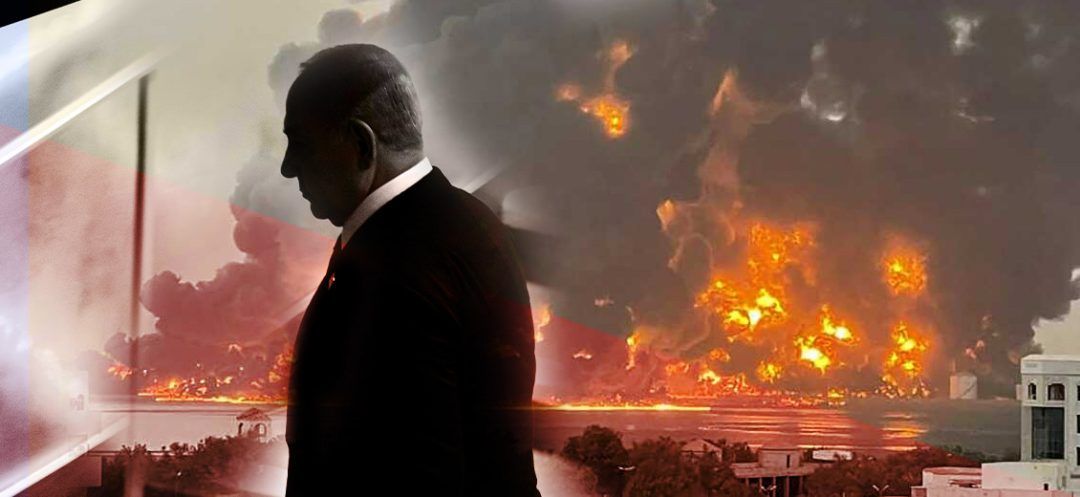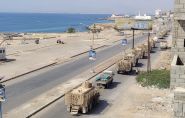- Home
- Middle East
- A Timed Military Escalation Ahead of Netanyahu’s US Visit?

Following a Houthi drone attack on Tel Aviv on Saturday, Israeli fighter jets launched an assault from the Nevatim Airbase (Negev) on oil and electricity facilities in the Yemeni city of Hodeidah. On Sunday, a Houthi official stated, "Israel made a serious mistake. We will retaliate in a strong and appropriate manner." Meanwhile, the American news website Axios reported a senior Israeli official saying, "Israel does not want a regional war, but it will continue to protect its citizens from attacks."
Hezbollah responded with a statement, saying, "We believe this signals the beginning of a new and dangerous phase of confrontation." This announcement came on the eve of Israeli Prime Minister Benjamin Netanyahu's three-day visit to Washington, suggesting that this latest military development will affect the visit's outcome. Prior to this military escalation, US Secretary of State Antony Blinken had noted, "We are close to finalizing a ceasefire agreement."
Sources indicate that President Joe Biden will try to finalize a peace deal during the visit, despite Netanyahu's reluctance to agree to a ceasefire. The Israeli PM has escalated military operations on various fronts, including Yemen, while securing the Knesset’s rejection of the establishment of a Palestinian State within Israel's borders. He heads to Washington strengthened, both politically and militarily, and confident that, on the eve of elections, the Biden administration has become a "lame duck," unable to exert pressure on him or enforce its demands.
Will there be regional developments before the US elections that could shift the current dynamics? And what about Lebanon?
On the international level, Lebanon has fallen off the US priority list, overshadowed by the heated and violent election battle. Likewise, Lebanon is no longer a priority for France, which has been overtaken by its heated legislative elections.
Locally, the resolution of the crisis remains elusive, trapped between the opposition camp and the Moumanaa or the pro-Hezbollah “Resistance Axis,” amid endless debates and mutual accusations. The Shiite duo (Amal-Hezbollah) has remained firm in its positions and is unlikely to yield until its political demands are met. Meanwhile, House Speaker Nabih Berry has advocated for a ten-day dialogue to resolve the crisis, potentially electing a president on the last day. According to sources close to Berry, the goal is to establish a comprehensive framework that addresses not only the presidency but also the prime minister, the government and key reforms. The same sources indicate that this comprehensive package requires a consensus reached through dialogue with all parties without exception.
Meanwhile, political sources close to Hezbollah indicate that halting all campaigns against the “resistance” is a prerequisite for any discussions on the matter, and that Hezbollah insists on dialogue according to Berry’s proposal.
The opposition camp retorts, "Anyone who wants a president must make concessions, facilitate the process, and adhere to the Constitution,” instead of clinging to its one and only candidate Sleiman Frangieh.
MP Gebran Bassil, leader of the Free Patriotic Movement (FPM), made a proposal to Hezbollah, suggesting that FPM MPs provide the two-thirds quorum needed for presidential election sessions on the condition that Hezbollah abandons its support for Sleiman Frangieh and refrains from backing Lebanese Army Commander-in-Chief Joseph Aoun. Instead, Bassil recommends choosing a third candidate – an independent figure who would be acceptable to both the FPM and Hezbollah.
Amid internal divisions over political priorities, opposition sources argue that some are pushing to align Lebanon with external political agendas that do not serve the country’s interests. They question Lebanon’s current adherence to the 1943 National Pact. In this context, some political observers suggest that Qatar, a member of the Quintet (France, Saudi Arabia, Qatar, Egypt, USA), might propose a conference in Doha similar to the 2008 summit, which led to the election of General Michel Sleiman as president following a consensus on the political situation.
A Western diplomat argues that resolutions and settlements in the region will remain pending until a US-Iranian deal redefines the Middle East, Lebanon’s multiple crises being a key component of the equation.
Read more



Comments